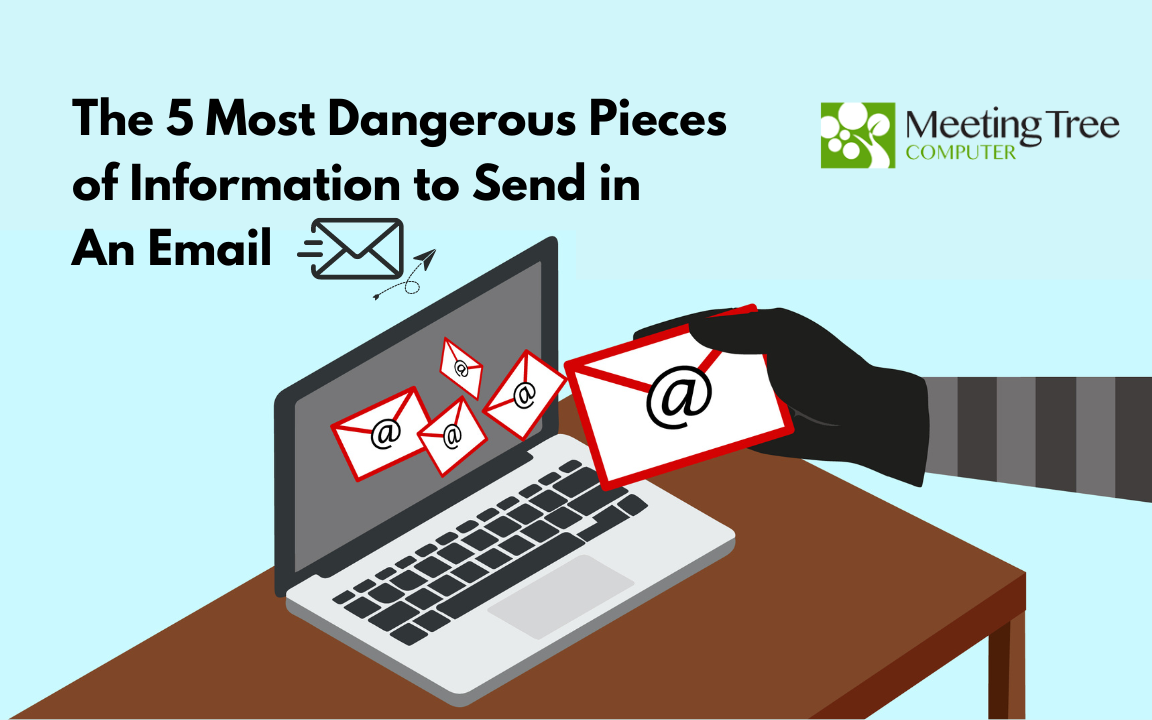In the book Spam Nation, investigative journalist and cybersecurity expert Brian Krebs revealed the single most effective (and relied upon) way cybercrime rings gain access to your bank account, credit cards and identity.
Ready for it?
Email.
Whether it’s opening an attachment infected by a virus, or a phishing scam where you unknowingly give up the password to your bank account, email remains the most popular, deceiving and successful way in which digital thieves rob you blind, steal your identity and wreak havoc on your network.
And worst of all?
You’re INVITING them in!
While there are lots of security measures available to protect yourself against cyber crooks, none of them are absolutely 100% foolproof and you can lower your risk of exposure and scams by never putting these five pieces of information in a basic, unencrypted, email:
Your social security number.
Think of this as your “bank account” number with the government. You should never email this to anyone because it can be used to open credit cards and steal your identity.
Banking information.
Your bank account numbers, routing number, and online banking login credentials should never be emailed. Further, avoid sending a voided, blank check as an attachment to an email as you could hand over the keys to your financial kingdom should crooks get their hands on the details of your routing and account info.
Your credit and/or debit card information.
NEVER update a credit card via an email! If you need to update a card with a vendor, there are two safe ways to do this:
The first is to log in to your vendor’s secured site by going to the URL and logging in. Do NOT click on a link in an email to go to any web site to update your account password or credit card! Hackers are masters at creating VERY legit-looking emails designed to fool you into logging in to their spoof site, which LOOKS very similar to a trusted web site, to enter your username, password, and other financial details, thereby gaining access.
Another way to update your account is to simply CALL the vendor direct.
Login credentials and passwords.
You should never share your passwords or answers to security questions with anyone for any site, period.
Financial documents.
An attachment that includes any of the above is just as dangerous to email as typing it in. Never email any type of financial documents (or scans of documents) to your CPA, financial advisor, bank, etc.
Remember: Banks, credit card companies and the government will NEVER ask you to click a link to provide them with any of the five items above. If you get an email requesting you update any of the above information, there’s a good chance it’s a phishing email from a hacker. Don’t be fooled!
So, I Clicked on a Suspicious Link – What Now?
If you are a MTC Managed Services Client, give us a call right away, we’ll take care of everything for you! If not, keep the following four steps in mind:
- Disconnect.
Immediately terminate your internet session by unplugging the ethernet cable, turning off the router, or disconnecting from the WiFi. - Back That Thing Up.
Before anything bad happens you’ll want to back up your files. Data and files can be easily destroyed or locked, in the event of a successful phishing attack. You should be doing this chore as regular maintenance, because in the event of a cyber-attack, you may not have the option to do a last-minute backup! At Meeting Tree Computer, we have some cool tools that can take care of this for you, scheduled at your convenience, hourly, daily, whatever you need. - Run a Full System Scan.
Run your antivirus/anti-malware software. It’s also a good idea to get a Darkweb Scan to be sure your company credentials and other passwords are not leaked as well.
If you’d like to learn more about what Meeting Tree Computer can do for you, or if you would like to schedule a free business IT consultation contact us today.
Meeting Tree Computer is a complete technology solution provider in the Hudson Valley area. We’re located in Salisbury Mills, NY but we provide IT services to all of Orange, Dutchess, Putnam, Rockland, Sullivan, Ulster and Bergen county.
Learn more about Meeting Tree Computer here

